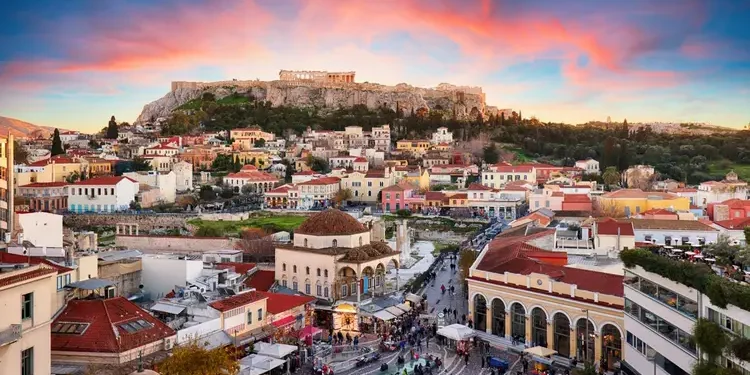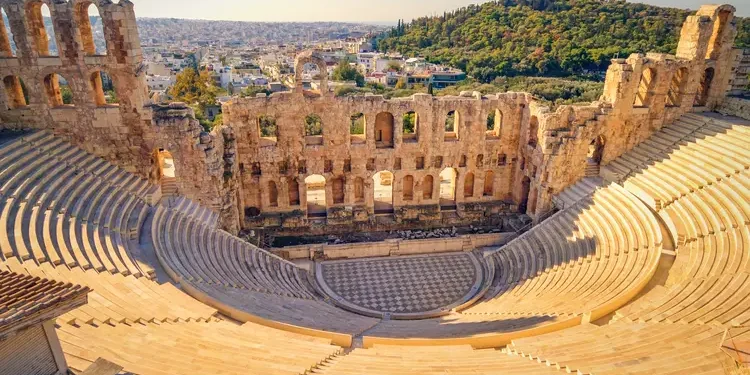One part of culture shock I cannot get over, no matter how many years I’ve been in Greece, is the Greek attitude towards time.
As an American, I was always told time was something I shouldn’t waste, that time was money.
Since moving to Athens, I have had to acclimate to a slower pace of life.
The non-emphasis on punctuality is not unique to Greece, so I expect these experiences to be relatable to people across the globe…
The people of Greece are amazing. They’re lively, humorous, and friendly. However, they are—to put it bluntly—slow.
Time just isn’t a concern in the same way it is in America. Time is not measured in value; it is an expendable and indefinite resource here in the Mediterranean. While I am used to this now, I still struggle to shift my mindset.
Here’s a round-up of the ways that perceptions about time affect life in Greece…
1. Mediterranean Mealtimes
The first lesson with Greek time I had was with eating out. I soon learned that eating out meant I needed to ensure I had two hours.
The servers are mostly hospitable, but they’re in no rush. It’s not uncommon to be in a busy restaurant that only has two or three servers, and for one to be taking a short cigarette break.
To order and to pay are a matter of chasing down one of the elusive servers. I quickly realized that eating during the hour break I had available couldn’t include sit-down restaurants.
Dinner in particular is meant to be savored; you shouldn’t be in any rush to get away from the table, and so the waitstaff are not in any rush to get you away.
They don’t rely on tips as their primary source of income, so all having a high table turnover rate would do is create more work for almost no extra money.
2. The Walking Pace
I love the walkability of Europe when compared to the United States. There are sidewalks everywhere here, and while some are better than others, nowhere is completely unwalkable in Athens.
The downside of walking in Athens is the other pedestrians. I’m short, only five-foot-two, yet when I’m walking, I pass nearly everyone, fully grown men included. When I go on walks back home in Newport Beach, people walk laps around me.
Here, the lack of concern for time translates into so many aspects of life—even walking.
Everywhere I walk, I find myself stuck behind someone, rolling my eyes as I slow my pace until I have the opportunity to go around them.
I am raw html block.
Click edit button to change this html
Traffic And Transportation Troubles
I cannot say for sure what came first: the casual attitude towards time or the time required for transportation.
The roads in Athens are always full of traffic; the roads in the rest of Greece are narrow and winding.
The buses are often late, the metro (which is already limited) comes every 10 minutes, not five like in many other European cities, and the sidewalks are full of people who are sure to get in your way.
Perceptions About Punctuality
Running late can always be attributed to problems with transportation, and the excuse is never refuted. If you give no reason as to why you’re late, it could be chalked up to transportation troubles by default.
However, this laissez-faire approach to time is more welcome when you’re the one running late.
There’s a lot of understanding for tardiness. Being a few minutes late is not thought twice about.
There is less stress when I am late meeting my friends. I’m rarely the last to show up anyway.
When I make dinner reservations, I never worry about the “15 minutes before you lose the table” rule so often encountered in America.
This isn’t to say you can show up hours late and expect people to wait for you, but up to 30 minutes isn’t a big deal for informal settings, and people are more generous with a few minutes’ tardiness in formal settings than they are in the States.
Even so, a quick text or email informing someone that you’ll be late usually suffices.
Business Hours And Napping Culture

Something unusual to me that I have grown to appreciate is the culture of napping. People will often take a few hours out of the working day to go home and sleep.
Sadly, this aspect of Greek culture is fading out as they adapt to a more Western work schedule, but it still isn’t atypical to go to a store midday to realize they have closed for a few hours during the peak heat of the day.
While 2 p.m. to 5 p.m. are prime retail hours for Americans, this has traditionally been a time to close shop to have lunch and take a nap for Greeks.
This isn’t to say Greek people don’t work due to their different view of time… In fact, they have the longest working hours in Europe.
Generally, things are open considerably late. Shops don’t close until 9 p.m., which is later than in much of Northern and Western Europe.
You’ll see traditional restaurants all over the country that stay open into the morning hours, only closing the doors when the final customers decide they’re ready to get up and go.
The clubs and bars stay open until most Americans are on their way to work.
Late nights are a Mediterranean staple. The midday nap leads to a late dinner and a late sleep. This schedule persists no matter how early in the morning one needs to get up.
What About The Future?
Greece is “modernizing” slowly but surely, as most people have moved to the city rather than living in their family’s village. Time in cities is a more serious business.
As a result, Greece is now keeping more regular store hours, and having a designated nap is not common like it once was.
While not as intense about punctuality, it’s noticeably more valued in modern cities like Athens than in the villages where the old attitudes remain.
Time is viewed more and more as having an intrinsic value, yet the mentality has not shifted as far as the views.
For example, people will apologize for being late as if they feel they have wasted that time, but rarely is anyone truly bothered by it.
Sincerely,
Olivia Redler
Contributor, In Focus: Europe
Editor’s note: Greece was one of the countries that made the grade in our recently-released 2025 Overseas Retirement Index.










